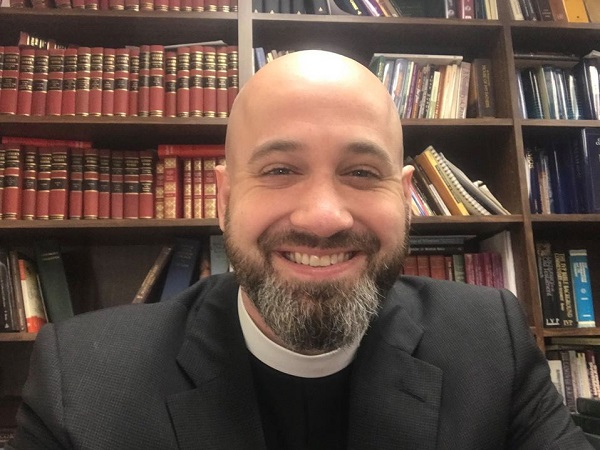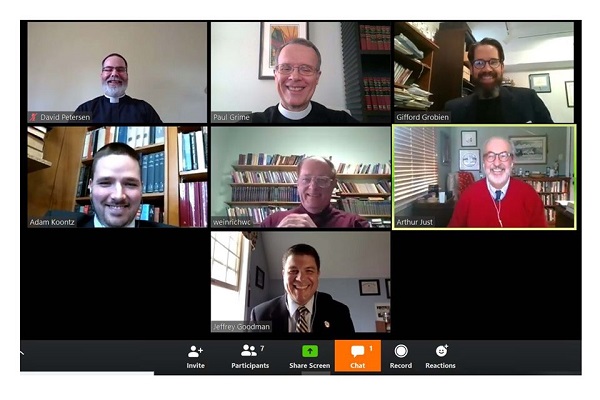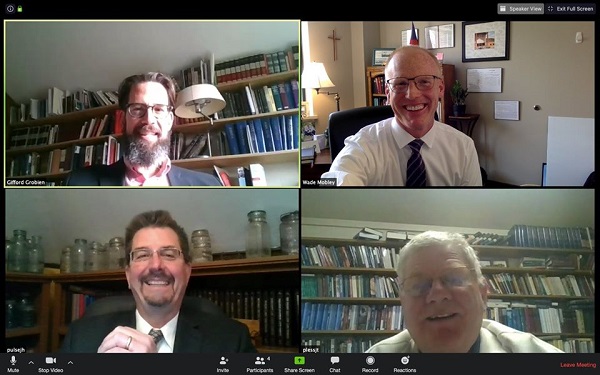We’ve had three Doctor of Ministry (DMin) defenses at CTSFW this past quarter. The DMin Program is designed for the working pastor, and their dissertations always reflect a topic or project that will serve their particular parish or synod in service to the Church. All three men gracious introduced themselves, spoke about their dissertation topics (all of which you can see are tied into who they are and where they serve), and what the DMin Program meant to them. In alphabetical order:
Rev. Peter Elliott; Associate Pastor, Saint John Lutheran Church, Fraser, MI
The Plan of Salvation: A Fifteen-Week Christological Survey of the Scriptures for Saint John Lutheran Fraser, Michigan

“I’m a lifelong Lutheran. I was born in Ft. Wayne as my father Mark was graduating CTSFW in 1984. From my earliest memory I’ve wanted to be a pastor. My older sister Christy Rivers is a teacher at Faith Lutheran in Plano, TX, where she attends with her husband Matt. My older brother Paul Elliott is ordained, serving as a professor at Concordia Irvine, and his wife Krista teaches at St. John Orange. My younger sister Sarah lives in Dallas, where her husband, Adam Douthwaite, serves as a pastor at Our Redeemer. We all live within the LCMS bubble. I am married to my wonderful wife, Valerie, and we have 7 children: Elijah, Daniel, Isaiah, Grace, Moses, Hannah, and one in the womb.
“Since fall 2017, I’ve served as the associate pastor of St. John Lutheran Church and School in Fraser, MI. Fraser is north/northeast of Detroit, and St. John is a traditional congregation known for its school and excellent music, led by organist Mel Machemer. The congregation is about two-thirds ages 45 and younger, and we have about 600 in attendance each weekend.
“Many of the newest members come from unchurched backgrounds, which is exciting, but it has also caused difficulties. Even after attending our catechetical new member class, biblical literacy is often lacking. Therefore, I was charged with creating and leading a 15-week overview of the Bible for new members. This became my DMin project. The class covered the general content of each book of the Bible, the centrality of Christ, and Law and Gospel. The overall goal was to increase the participants desire to attend future congregational Bible studies.
“The feedback from the class—as reported through surveys and focus groups—was overwhelmingly positive. The participants were surprised by the connections between various books of the Bible and between the two testaments. The participants especially found joy in seeing Christ in the Old Testament. Bible study habits have improved, and new members have craved pastoral instruction, even during this pandemic. Through teaching the 15-week course, I became interested in the topic of typology, and so the dissertation includes an excursus on Christ types of the Old Testament.
“I would highly recommend the DMin program at CTSFW, and I’ll miss intensive courses because of the fellowship and the time I was given to attend chapel. The seminary has refreshed me for ministry in Christ’s Church.”
Rev. Jeffrey Goodman; Pastor, Salem Evangelical Lutheran Church, ELCA, Ephrata, PA
The Mid-Week Divine Service: Its Theology, History, Usage and Implementation in a Lutheran Parish Church

“I came into The Lutheran Church through attending a Wednesday Divine Service. To be able to receive our Lord’s Word and Sacrament in the middle of the week was a great comfort to me. So when I received a call to serve a small, struggling Lutheran parish in Lancaster County, PA, I was charged early on with developing a second service. The common assumption was that we would add another service to our Sunday, but I remembered how I came into the Lutheran Church through a Divine Service during the week and how others may as well.
“We initially began with a vigil service on Saturdays, but this service after a year never gained traction. At the suggestion of an experienced local pastor we moved the service to Thursday evenings. Over time we were able to build a chapel for the Thursday service and eventually expand our liturgical offerings to other days of the week as well. Moreover, our liturgical calendar expanded when we started placing commemorations on the church’s calendar instead of moving them to Sundays. The second half of the paper chronicles this history.
“The first part of the paper explores the biblical evidence for having services outside of the Sunday assembly. It also looks at how the mid-divine service was used in the early church and up to the Reformation. From that I explored how the mid-week Divine Service has been used in my own tradition here in Pennsylvania through examinations of Heinrich Muhlenberg, and his heirs in the General Council of which the parish I serve was once a part. I do consider the Sabbatarian arguments made by SS. Schmucker and his Gettysburg/General Synod colleagues. Finally, three churches from the same “Muhlenberg tradition” were examined to see how they have used the mid-week divine service in their lives together.
“Because of the mid-week Divine Service, the small parish I serve has seen growth not only in numbers, but in its life together. We went from being a church that only gathered on Sunday to being a church that gathers multiple times during the week. I believe this is essential to forming a resilient, long lasting Lutheran parish church. It has also made me a better preacher simply by requiring me to prepare for more than one sermon a week. I find myself preaching two, three, and even four times a week. This makes for a more effective preacher of the Word in my mind.
“The DMin Program at CTSFW has been wonderful. I am leaving the program a much more confident and informed pastor. I have come to understand to a deeper degree what it means to be called by a parish. In my mind there is no better place for a Lutheran pastor to study then CTSFW. I am not LCMS and I was welcomed by my fellow students and teachers, but I was also challenged by them to think through my own tradition, the nature of a call, and what it means to be a faithful Lutheran pastor.”
Rev. Wade Mobley; President, Free Lutheran Bible College and Seminary)
Sharper: A Proposal for Continuing Education within the Association of Free Lutheran Congregations

“The Association of Free Lutheran Congregations has no specific scope or delivery method for continuing education for her pastors. I serve as the President of our Bible College and Seminary, so I am in a position to advocate and provide for this continuing education. My project focused on finding out what/how our men are educating themselves, what their needs are for continued sharpening, and how we can best augment our MDiv program.
“The outcome of the project was a theologically-focused aim for continuing education that uses existing and yet-to-be developed means for formal and informal continuing education. The irony, though, is that the week I submitted my dissertation the whole world shut down, our summer opportunities are much in doubt, and planning for next fall seems presumptuous to our constituency. That said, this too shall pass, and I will put our plan into practice 6-12 months later than stated.
“I am thankful for the DMin program at CTSFW. I started the program shortly after accepting the call to leave my congregational ministry of twelve years to serve as President of the Free Lutheran Bible College and Seminary (the Bible College and Seminary of the Association of Free Lutheran Congregations, AFLC). The program was academically rigorous, but also logistically accessible. The courses were well designed and the instructors highly qualified. Dr. Gifford Grobien and Mrs. Cynthia Johnson administered the program with efficiency and friendliness. Though I serve outside of the LCMS, I enjoyed the fellowship of Christian brothers in class, on campus, and online. My capacity for ministry quality and quantity increased in my time of study, and I will forever be thankful for the quality education offered by CTSFW for the benefit of our institution and the AFLC.”
You can learn more about the DMin Program at www.ctsfw.edu/DMin, or by contacting the CTSFW Office of Graduate Studies at graduatestudies@ctsfw.edu or (260) 452-2203.
